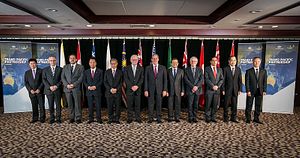After five and a half years of negotiations, the 12 countries participating in the Trans-Pacific Partnership (TPP) talks managed to reach an accord on October 5 in Atlanta, Georgia. Japanese Prime Minister Shinzo Abe hailed the accomplishment, saying, “This is a significant achievement not only for Japan, but also for the future of the whole Asia-Pacific region.” He also praised the agreement by describing it as “a farsighted policy for all participating countries that share the values and try to build a free and fair economic zone.” The trade deal, which covers 40 percent of the global economy, will reduce tariffs and set new standards for participating countries.
This trade agreement is central to U.S. President Barack Obama’s “rebalance” to Asia, because it would allow the U.S. and U.S. allies and partners to establish the “rules of the road” for free and fair trade in the most economically dynamic region of the world. China’s recent gains in institution-building, most vividly manifested by the establishment of the Asian Infrastructure Investment Bank (AIIB), are concerning to the United States and Japan. They fear China’s alternatives could lead to a dilution of the transparency, labor, and environmental standards that these capitalist-democracies had worked so hard to create through the Asian Development Bank (ADB). Instead of falling behind again, the United States and Japan realized they needed to get ahead of the game.
In addition to strategic and intangible benefits, Japan also profits concretely from the TPP. First of all, regulations over foreign companies entering markets have been relaxed, and this will make it easier for Japanese companies to expand overseas into new opportunities.
Second, the auto industry will benefit from a phase-in in the reduction of tariffs on their exports. Also, they will be allowed to buy more parts for their products from Asia, including, significantly, from countries not in the TPP. The “rule of origin” requires only 45 percent of the vehicle to be made in the TPP zone; in the North America Free Trade Agreement (NAFTA), the equivalent figure is 62.5 percent. Being able to buy cheaper parts from countries such as China, and then sell vehicles with reduced tariffs to markets such as the U.S. is good for the Japanese auto industry.
Third, the lowering of tariffs on farm, dairy, and other goods will help lower the costs of these items to Japanese consumers. Even though tariffs on such farm goods are only reduced and not eliminated, opposition to the TPP could still be rallied by farmers who may see their products being undercut by cheaper imports. Another way farmers could oppose the TPP is to form an alliance with concerned consumer groups; Japan has some of the most stringent food safety laws in the world – which have often been accused of being protectionism in disguise. But instead of focusing on how to protect their share of the domestic market through government intervention, farmers should focus instead on how they can achieve efficiency in order to compete against foreign imports with the reduced tariffs – or possibly even abroad.
Abe is fully aware of the challenges, and he has demonstrated a desire to head off such concerns in his personnel choices: in a Cabinet reshuffle that saw much continuity in the economic leadership, Hiroshi Moriyama was tapped as the Minister for Agriculture, Forestry, and Fisheries. Moriyama heads a Liberal Democratic Party (LDP) committee on the TPP, and is likely expected to play a strong role defending the agreement from disgruntled farmers.
Fourth, the completion of the TPP will give Japan leverage to quickly conclude trade agreements with other countries. For example, Japan’s negotiations with the EU may be sped up by the EU’s desire to not be left out.
So what next for Japan and the TPP? Previously, there had been discussion of a special legislative session this autumn, possibly in November, but due to the secrecy surrounding the agreement, the debate in Japan is likely to be pushed off until at least January. Because the pact itself has to be drafted for signature, and because of the 90-day review period for the U.S. Congress, the Japanese Diet does not really have anything to debate until then. Abe’s busy diplomatic schedule also makes an extraordinary session unlikely.
However, pushing the ratification too close to the summer could also have negative consequences for the LDP if the issue becomes caught up in the upper house elections to be held next summer. But with recent agricultural reforms that broke the agricultural cooperatives’ chokehold on power and the overall aging of the farming population, it is unlikely that Abe will be forced to succumb to agricultural interests after having staked so much on the deal. Finding a good balance for timing will be tricky, but not impossible.

































